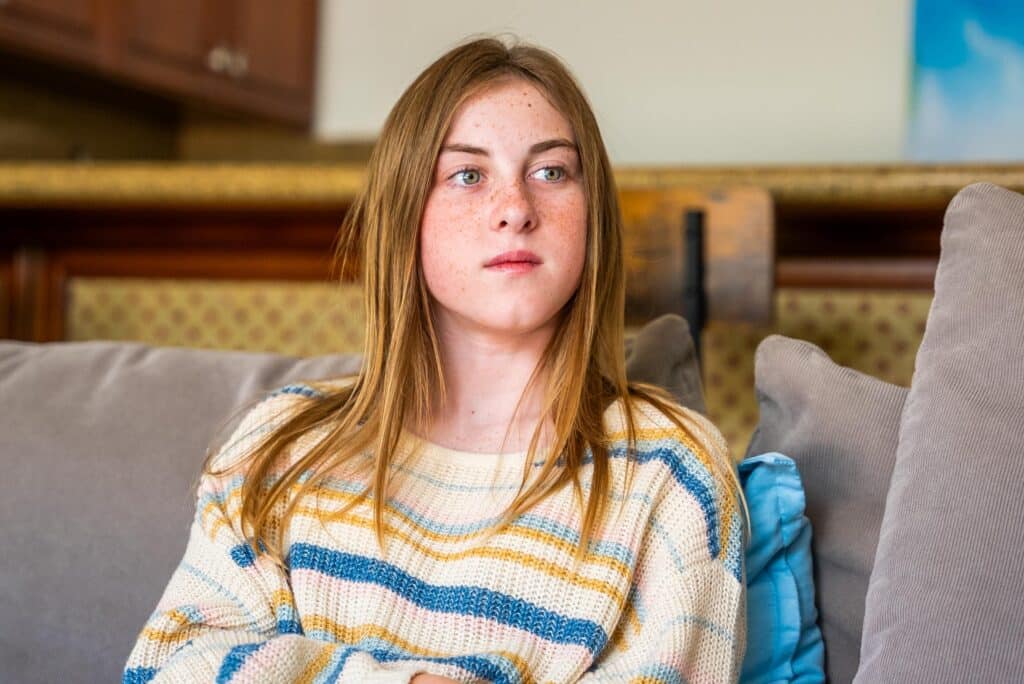Teen Reactive Attachment Disorder Treatment (RAD)
Teen Reactive Attachment Disorder (RAD) consists of a child’s emotional detachment from their parents or caretakers. Normally, this disorder begins in the early years of childhood.
Contact us today to begin therapy and find your path to recovery.

At Beachside Teen Treatment Center, we understand that parenting a teenager with Reactive Attachment Disorder (RAD) can be overwhelming. Located in the serene surroundings of Malibu, California, our residential facility offers a safe, nurturing environment for teens struggling with mental health and behavioral challenges. Our comprehensive Teen Reactive Attachment Disorder Treatment program is designed to address the unique needs of adolescents and their families, providing the tools necessary for healing and growth.
Learn more about our teen behavioral disorder programs or call us now at 877-983-5144.
Teens with social anxiety disorder (SAD) / social phobia have an excessive and persistent fear of social performance in social situations such as school, parties, athletic activities, and more. They are extremely anxious about doing something embarrassing in front of others, or that others will think badly of them. These teens constantly feel “on stage,” which can lead to a great deal of self-consciousness, distress, and avoidance.
Teens with social anxiety disorder (SAD) / social phobia have an excessive and persistent fear of social performance in social situations such as school, parties, athletic activities, and more. They are extremely anxious about doing something embarrassing in front of others, or that others will think badly of them. These teens constantly feel “on stage,” which can lead to a great deal of self-consciousness, distress, and avoidance.
Understanding Reactive Attachment Disorder
Reactive Attachment Disorder (RAD) is a serious condition that can develop when a teen experiences disruptions in early bonding and attachment with caregivers. It often stems from neglect, abuse, or unstable home environments during childhood. Without a secure attachment to a caregiver, teens with RAD may struggle to form healthy relationships, trust others, or regulate their emotions.
At Beachside Teen, we believe that understanding the roots of RAD is the first step toward healing. By exploring the underlying causes and addressing associated challenges, we help teens and their families rebuild trust, connection, and emotional well-being.
Signs and Symptoms of Reactive Attachment Disorder
Identifying RAD in teens can be challenging, as symptoms often overlap with other mental health conditions. However, common signs of RAD may include:
- Difficulty forming emotional bonds with others
- Persistent feelings of mistrust or fear of intimacy
- Avoidance of physical touch or affection
- Aggressive or oppositional behavior
- Lack of remorse after misbehavior
- Low self-esteem or feelings of worthlessness
- Difficulty empathizing with others
- Emotional withdrawal or detachment
If your teen exhibits one or more of these behaviors, they may benefit from professional Teen Reactive Attachment Disorder Treatment.


How to Help My Teen with Reactive Attachment Disorder
As a parent or caregiver, you play a crucial role in your teen’s recovery journey.
Here are some ways you can support your teen with RAD:
- Foster a Safe and Stable Environment: Consistency and structure help teens feel secure.
- Practice Patience: Healing from RAD is a gradual process that requires understanding and perseverance.
- Encourage Open Communication: Create opportunities for your teen to express their feelings without fear of judgment.
- Seek Professional Help: Specialized therapy and treatment programs like ours are essential for addressing the complexities of RAD.
At Beachside Teen, we guide parents in supporting their teens through this journey, offering family therapy sessions and educational resources to strengthen familial bonds.
When Reactive Attachment Disorder Treatment Is Needed
Recognizing when your teen needs professional treatment for Reactive Attachment Disorder (RAD) is crucial to ensuring their long-term well-being. While all teens may exhibit challenging behaviors at times, RAD symptoms often go beyond typical teenage struggles. If your teen’s behaviors are consistently intense, disruptive, or interfere with their ability to function day-to-day, it may be time to seek professional help.
Warning Signs to Watch For
Escalating Behavioral Problems: Persistent issues at school, such as frequent detentions, conflicts with teachers, or refusal to follow rules, as well as defiance or power struggles at home, may indicate underlying attachment difficulties.
- Social Isolation: Teens with RAD may avoid social interactions or struggle to maintain friendships, often appearing detached or uninterested in connecting with peers.
- Persistent Defiance or Aggression: Ongoing anger, irritability, or aggressive outbursts—especially when disproportionate to the situation—are common in teens with RAD.
- Emotional Dysregulation: Severe mood swings, persistent anxiety, or deep depression may signal an inability to process emotions effectively, often stemming from early attachment disruptions.
- Risk-Taking or Self-Destructive Behavior: Engaging in dangerous activities, self-harm, or substance use can be a cry for help and a way of coping with unresolved emotional pain.
Why Early Intervention Matters
Without timely and targeted intervention, the symptoms of RAD can lead to long-term challenges, including chronic relationship difficulties, academic struggles, and mental health disorders. Seeking professional treatment not only addresses your teen’s current symptoms but also equips them with tools to build healthy relationships, manage their emotions, and succeed in life.
At Beachside Teen Treatment Center, our Teen Reactive Attachment Disorder Treatment program offers a safe, compassionate, and structured environment where teens can work through their struggles and begin to thrive. Our experienced team of mental health professionals is here to support your family every step of the way.


Causes of Reactive Attachment Disorder
RAD typically develops during early childhood due to adverse experiences that disrupt the formation of secure attachments.
Common causes include:
- Neglect or Emotional Deprivation: When a child’s basic emotional and physical needs go unmet, attachment bonds may not develop.
- Abuse or Trauma: Physical, emotional, or sexual abuse can interfere with a child’s ability to trust caregivers.
- Frequent Changes in Caregivers: Moving between foster homes, adoption placements, or other transitions can prevent consistent attachment.
- Institutionalization: Spending time in orphanages or similar environments may limit opportunities for bonding with a primary caregiver.
Understanding these root causes helps our team develop personalized treatment plans that address the unique experiences of each teen.
Our Approach to Teen Reactive Attachment Disorder Treatment
At Beachside Teen Treatment Center, we take a holistic and individualized approach to treating RAD. Our program focuses on creating a safe, supportive https://beachsideteen.com/programs/teen-intensive-outpatient-program/environment where teens can rebuild trust, regulate emotions, and develop healthy relationships.
- Individual Therapy: Teens meet one-on-one with licensed therapists to address the emotional impact of RAD and develop coping strategies.</li
- Family Therapy: Strengthening family dynamics is a cornerstone of our approach. Family sessions encourage communication, trust, and mutual understanding.</li
- Group Therapy: Teens participate in peer groups where they can connect with others facing similar challenges, fostering a sense of belonging.
- Trauma-Informed Care: Our staff is trained in trauma-sensitive practices that prioritize safety, empowerment, and healing
- Experiential Therapies: Activities such as art, music, and equine therapy help teens explore emotions and build self-esteem in creative ways.
- Life Skills Development: We prepare teens for future success by teaching practical skills like conflict resolution, emotional regulation, and social interaction.
Our evidence-based treatment plans are tailored to each teen’s unique needs, ensuring they receive the highest level of care.
Levels of Care for Teen Reactive Attachment Disorder (RAD) Treatment
At Beachside Teen Treatment Center, we offer tailored programs to help teens with reactive attachment disorder (RAD) overcome challenges and build healthy emotional connections.
- Residential Treatment Program: Provides a secure, structured environment with 24/7 care and intensive therapy to address the underlying issues of RAD.
- Partial Hospitalization Program (PHP): A day program offering therapeutic support and skill-building, with evenings at home to practice fostering positive relationships.
- Intensive Outpatient Program (IOP): Offers flexible therapy sessions for teens managing RAD while maintaining daily routines, like school and family life.
Our dedicated team is committed to helping teens with RAD heal and develop the tools they need for meaningful, lasting connections.

Why Beachside?
At Beachside Teen, we create a nurturing environment where adolescents can heal and thrive.
Our team of dedicated professionals specializes in adolescent mental health, and our programs are designed to meet the unique developmental needs of teenagers. With a focus on compassion, understanding, and long-term success, we help teens and their families rediscover hope.
Begin The Healing Journey Today
Your teen’s well-being is too important to wait. If your child is struggling with depression, reach out to Beachside Teen today. Our compassionate team is ready to guide your family toward healing and brighter days ahead.



